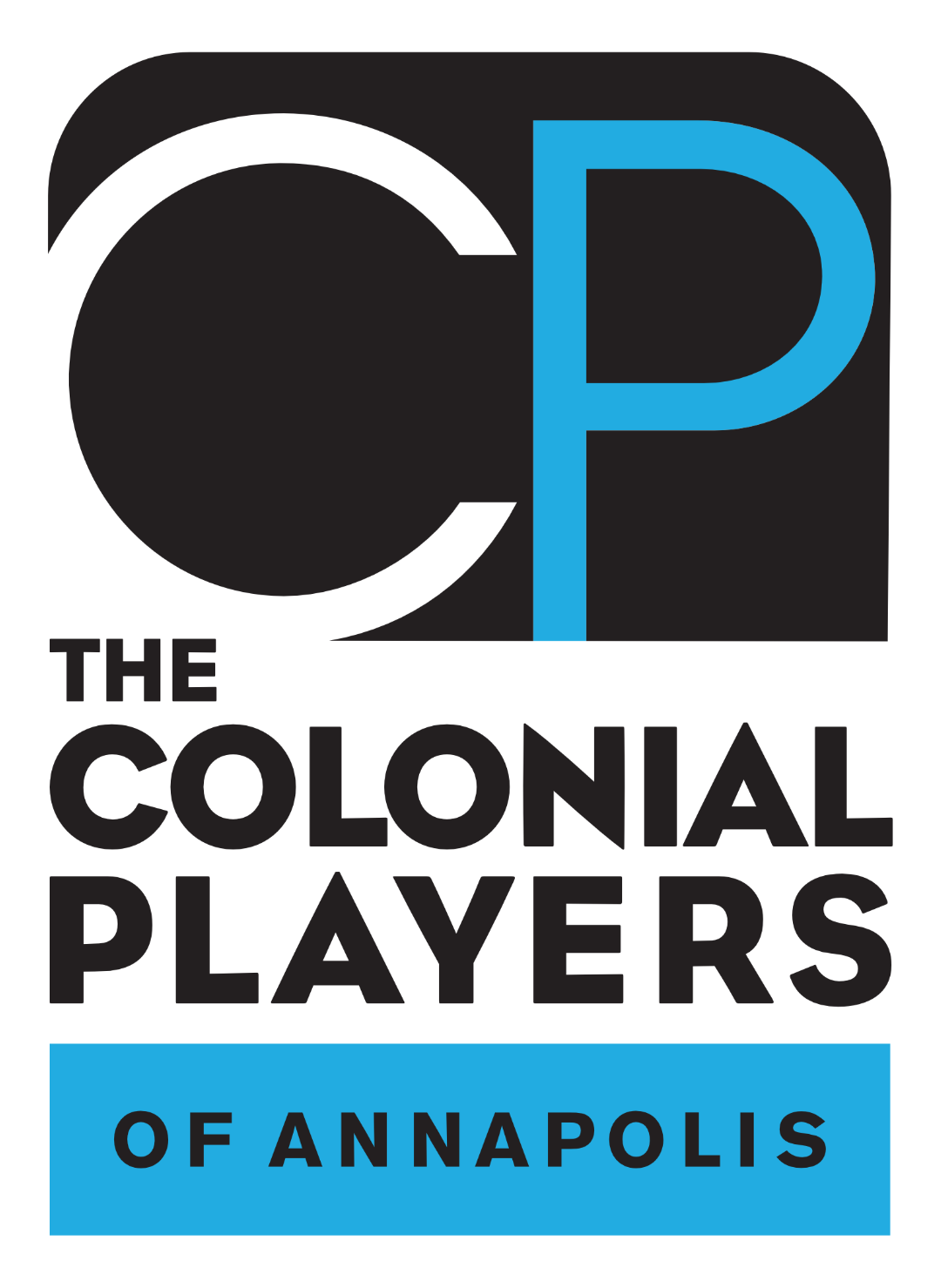THURSDAY, MARCH 1, 2012
Don't Call Me Shirley
by Karen Grim
"When I started out, I didn't have any desire to be an actress or to learn how to act. I just wanted to be famous."
-Katharine Hepburn
Maybe it’s wrong, and I’m sure there will be people out there who judge me for this statement, but all I ever wanted was to be famous. When I was little, I wanted to be the next Shirley Temple. As I got older, the caliber of role model I chose became greater, so I don’t really feel bad about my first “mentor.” Eventually, it became more about wanting to play the roles they chose and the style of actors they were, and less about the fabulous life they lived, though who wouldn’t want a mansion in Malibu? And, now that I’m more secure in who I am as a person, and also in my process as an actor, I’ve developed a way of creating a character that is as unique to me as it is to every actor.
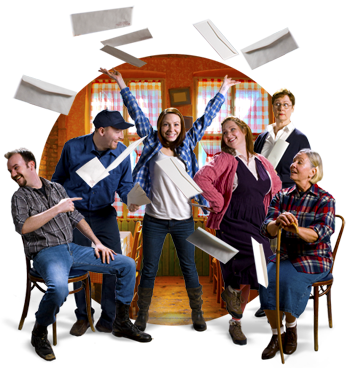 At age 7, I was precocious, outspoken and loved to sing – just like Shirley Temple. I would have been great in The Little Princess. Not because I had a rich father who got amnesia in a war and was assumed dead so I had to live in an orphanage, but because I know what it’s like to lose a parent and to have to overcome that with imagination and hope. But, I digress; what I’m trying to say is, I think that the roles you choose to play say a lot about who you are, or even who you want to be. I’ve played a lot of different characters in what I would consider a limited theatrical experience: boys, sluts, old women, and a lot of 12 year-olds (hey sometimes it pays to look young). But in each character I’ve always been able to find something we had in common or something that I identified with and was able to create, what I think, was a believable, real person. And to me that is what acting is: breathing life into a different facet of yourself so you can literally be someone else, and then live his or her life, or at least a two-act, sometimes one-act portion of it.
At age 7, I was precocious, outspoken and loved to sing – just like Shirley Temple. I would have been great in The Little Princess. Not because I had a rich father who got amnesia in a war and was assumed dead so I had to live in an orphanage, but because I know what it’s like to lose a parent and to have to overcome that with imagination and hope. But, I digress; what I’m trying to say is, I think that the roles you choose to play say a lot about who you are, or even who you want to be. I’ve played a lot of different characters in what I would consider a limited theatrical experience: boys, sluts, old women, and a lot of 12 year-olds (hey sometimes it pays to look young). But in each character I’ve always been able to find something we had in common or something that I identified with and was able to create, what I think, was a believable, real person. And to me that is what acting is: breathing life into a different facet of yourself so you can literally be someone else, and then live his or her life, or at least a two-act, sometimes one-act portion of it.
Now, I’m not going to sit here and tell you how to be a good actor. I would never presume to think that highly of whatever skill I may have, but I do believe that identifying with your character is essential to being able to bring him or her to life.
In Colonial Players' next show, The Spitfire Grill with Music and Book by James Valcq and Lyrics and Book by Fred Alley, I’m playing Percy Talbott, an ex-convict from WV who gets released from prison and tries to start over in Gilead, Wisconsin. Initially, looking at the character, there were some obvious similarities between us that drew me to her (shout-out to WV!!), and also some vast differences that just as an actor, I wanted to play because they were so dissimilar to me, and I wanted to challenge myself. Now that I’m interested in more than just being famous, the whole process from beginning to end is an adventure, and I love every second.
And just so you don’t go off thinking that this is a one-woman show, I’d like to introduce you to a few of my fellow castmates. I thought you’d enjoy getting to know them through our process and how/why they caught the acting bug.
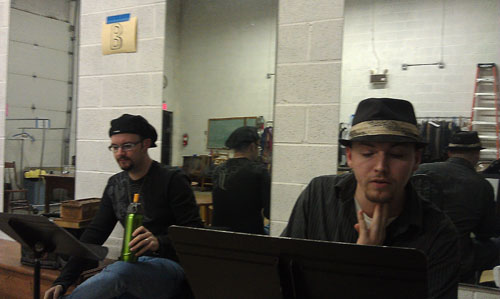 Sandra Rardon, playing Shelby Thorpe, made her acting debut as Elf #20 in her school’s original Christmas Pageant in 1st grade. She said that the parents in the auditorium were being so loud until she stepped up to the mic. She only had two lines, but she was “so loud that everyone got quiet,” and after she finished, everyone applauded. Just that one moment was all it took, and she’s loved it ever since. She enjoys that for two hours she gets to try out someone else’s life. And I agree with Sandy – whether it’s two lines or two hours, there’s no feeling quite like being applauded.
Sandra Rardon, playing Shelby Thorpe, made her acting debut as Elf #20 in her school’s original Christmas Pageant in 1st grade. She said that the parents in the auditorium were being so loud until she stepped up to the mic. She only had two lines, but she was “so loud that everyone got quiet,” and after she finished, everyone applauded. Just that one moment was all it took, and she’s loved it ever since. She enjoys that for two hours she gets to try out someone else’s life. And I agree with Sandy – whether it’s two lines or two hours, there’s no feeling quite like being applauded.
Eric Hufford, playing Joe Sutter, said that it wasn’t until high school that he wanted to be onstage. He was involved in so many activities from football to jazz band that he never had any time for himself; but he saw how much fun the theatre kids were having so he wanted to join in. He said the school’s choir teacher was the one who pushed him to do musicals, though he was never actually in choir. It just goes to show what an influence a good teacher can have on you. I know I had a few of those!
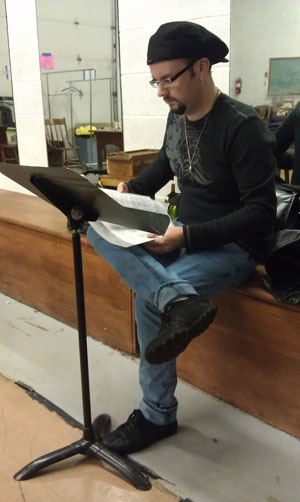 Lawrence Griffin, playing Caleb Thorpe, was about 12 years old when he saw his older brother playing Nathan Detroit in Guys and Dolls and thought, “Hey, that looks so cool, I want to be a part of it,” and it motivated him to act. And now he gets to provide the same inspiration for others, onstage and off, because Larry teaches Acting and Modeling at Casablanca’s in Timonium, MD.
Lawrence Griffin, playing Caleb Thorpe, was about 12 years old when he saw his older brother playing Nathan Detroit in Guys and Dolls and thought, “Hey, that looks so cool, I want to be a part of it,” and it motivated him to act. And now he gets to provide the same inspiration for others, onstage and off, because Larry teaches Acting and Modeling at Casablanca’s in Timonium, MD.
No matter where your inspiration comes from, who your mentor is, or what drives you to perform, it’s not something you can just ignore. Acting, the entire process, from creating a character to your final bow on closing night becomes entrenched in your soul. It’s an addiction of sorts (Pat Reynolds did not make that up!!). But acting isn’t a drug anyone would want to give up – though it is habit forming, it’s usually pretty harmless unless you’re a method actor – but that’s a topic for a different blog.
Oh, by the way, my name is Karen Grim (one ‘m’, no relation to The Brothers); I’m 27; I have a BFA in Performance Theatre from High Point University; I have a super awesome dog named Elvis; and I’m your new blogger. If you want to know more about me, you’ll either have to Google it, or wait for the next blog. I have to remain a little mysterious, right?
Oh and one more thing – I did eventually take up tap dancing, because hey, Shirley Temple had skills and now, so do I…sort of.
Written by,
Karen Grim
(still not famous ☺, but I’m working on it)
WEDNESDAY, FEBRUARY 1, 2012
OffBook: Chapter Two
by Laurel Kenney
“I think my greatest weakness is that I can’t write outside of my own experience.”
-Neil Simon
Hello readers of OffBook, the blog. My name is Laurel Kenney, and I’ll be taking over blogging duties for the month of February or until we can find someone better equipped than I to write a blog about theater. I feel extremely honored that those in charge have enough to faith in me to believe that I am capable of producing something halfway decent, but I have to admit – I am not what one would typically consider a “theater kid.” I was in a few productions in high school and in college – mostly musicals, as I never really felt completely comfortable onstage unless I was singing. It’s because of this that I feel rather less than qualified to write about theater with any sort of authority. However, before I completely exclude myself in your eyes, let me just assure you that what I do know about is writing. So in following with my opening quote from Mr. Simon, I’m going to talk about what I know.
When I found out that Colonial Players was going to be staging a production of Chapter Two by Neil Simon, I decided to give it a read (I’m a voracious reader, though not usually of plays, shamefully). I knew ahead of time that many critics believe that Chapter Two is almost entirely autobiographical (as is commonly assumed with many of Simon’s other works as well). In fact, Simon, himself, has sometimes been quoted stating as much…or has he? In an interview with James Lipton from a 1992 issue of the “Paris Review,” Simon seems to simultaneously agree and disagree with this notion. "Chapter Two was, literally, the second chapter of my life, after my wife Joan died and I married Marsha.” This seems pretty cut and dry. However, later, while discussing a different play “…But I’ve told interviewers that if I meant it to be autobiographical I would have called the character Neil Simon. He’s not Neil. He’s Eugene Jerome [from the ‘Eugene trilogy’]. That gives you greater latitude for fiction. It’s like doing abstract painting. You see your own truth in it, but the abstraction is the art.” So, I think then, that I can safely assume that Chapter Two and many others of his plays are semi-autobiographical. A certain truth lies in each of them, whether it is in his plot, his dialogue, or his characters, but it may not follow his life exactly? Am I interpreting and illustrating this correctly??
 I would have to say (based on my studies and personal writing experiences) that I have come to possess the belief that it is nearly impossible to write without including at least some of yourself in your product – whether it be consciously or not. I’m sure there are those who would disagree with me, but I just don’t see how it would be possible to completely dissociate while creating a character. In a criticism of Chapter Two, John Simon states, “The characters in Simon are interchangeable because, with minor differences, they are all Neil Simon.” I don’t know that I would necessarily take it that far (each of the characters is fully in possession of his or her own individual personality), but I can definitely spot traces of the author in each. The rhythm of speech, the sense of humor, and the quick wit – all of the characters share similarities in these areas. It brings to mind, but to a lesser extent, the characters in Woody Allen movies – whether Allen is in them or not, his characters often sound as though their author is speaking directly through them. This makes me wonder – how much of Neil Simon or his real life experiences are in his plays, specifically Chapter Two? How is a director to interpret a play that could be based, in part, on the author’s life? Does the director make that fact known to the actors? Do they take the real-life people on whom the characters may be based into consideration in their character development? Really, I guess it varies depending on the production. So, armed with my many questions, I approached director Gwen Morton to get her take on Colonial Players’ upcoming production of Chapter Two.
I would have to say (based on my studies and personal writing experiences) that I have come to possess the belief that it is nearly impossible to write without including at least some of yourself in your product – whether it be consciously or not. I’m sure there are those who would disagree with me, but I just don’t see how it would be possible to completely dissociate while creating a character. In a criticism of Chapter Two, John Simon states, “The characters in Simon are interchangeable because, with minor differences, they are all Neil Simon.” I don’t know that I would necessarily take it that far (each of the characters is fully in possession of his or her own individual personality), but I can definitely spot traces of the author in each. The rhythm of speech, the sense of humor, and the quick wit – all of the characters share similarities in these areas. It brings to mind, but to a lesser extent, the characters in Woody Allen movies – whether Allen is in them or not, his characters often sound as though their author is speaking directly through them. This makes me wonder – how much of Neil Simon or his real life experiences are in his plays, specifically Chapter Two? How is a director to interpret a play that could be based, in part, on the author’s life? Does the director make that fact known to the actors? Do they take the real-life people on whom the characters may be based into consideration in their character development? Really, I guess it varies depending on the production. So, armed with my many questions, I approached director Gwen Morton to get her take on Colonial Players’ upcoming production of Chapter Two.
Laurel Kenney: To go back to the beginning, how long have you been interested in theater, and how did you originally get involved?
Gwen Morton: I grew up in a small town. The closest thing to live theater was the high school junior/senior class plays. I had a cousin who introduced me to these play scripts in the library and said, “Why don’t we go home and read them?” So when I started college that was the first place I headed – for the drama dept.
LK: As an actor?
GM: I went a small school. So I did everything. And then I went on and got my Master’s at the University of Arkansas in drama. I was doing both acting and directing at that point. I kind of backed away from the tech work, and I’m a better director than I am an actor. I still love performing, but mostly I do musical performance.
LK: How did you originally get involved with Colonial Players?
GM: When my husband was given the notice that we were being transferred to Washington, I started looking around at different aspects of all the communities around Washington, and the combination of schools and community and so forth drew us to Annapolis. And so then I went online and started looking at the theater companies, and Colonial just had a phenomenal structure and history to it. So, as soon as I could, once we got here, I got involved.
LK: Have you directed at Colonial Players before?
GM: I have. The first year I was here, I did The Curious Savage and then I did one of the One-Acts, the summer before last.
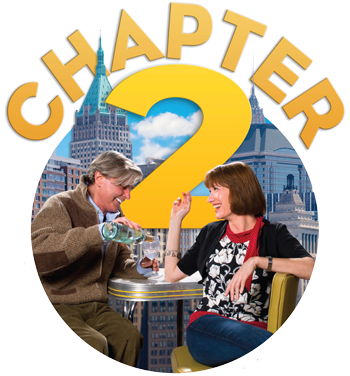 LK: What was it initially about Chapter Two that drew you in and made you want to take it on as a director?
LK: What was it initially about Chapter Two that drew you in and made you want to take it on as a director?
GM: The challenge of melding the elements we talked about – the comedy but also the very serious, based-on-reality issues. I also was drawn to the idea of seeing what has changed in New York City. And I feel that New York City is very much a character in the play. And it’s four wonderful roles for actors. So I felt it would really draw some outstanding actors, and it did. I’ve got an extraordinary cast.
LK: It’s commonly recognized that Simon’s Chapter Two is based, at least somewhat, on the author’s real life. Is that something that you expose the actors to, the crew? Is it important when you’re coming up with your vision?
GM: It’s different for different directors. I’ll start off saying that. For me, it’s something I like to get away from as much as I can. But in this case, you can’t. People who know theater know the story, so what I’ve chosen to do is address it, but then push it aside as much as I can. And one of the ways we’ve done that is updating it. The way we’re doing it takes place now, and his [Neil Simon] story took place in the 1970s. He actually went back and redesigned it in the late 90s, but looking at it now, it’s still incredibly dated. There are a lot of things that have changed – for instance both of the women in the play (the female characters) are actresses. In the original, they were soap opera actresses. But there are no soap operas currently filming in New York City. None. But there are a lot of other television shows that have started [filming]. So we’ve integrated some of the ideas of that.
LK: A critic says, “the characters in Simon are interchangeable, because with minor differences, they are all Neil Simon.” How do you feel about that? Do you feel like Neil Simon as a person is coming through a lot in his characters or do you feel like they are definitely each their own separate entities?
GW: I actually read that quote. I read that review. And to me that’s the fault of the director. Because a playwright writes himself – that’s all a playwright really knows. And that really is true of any play. So if the characters don’t stand out as individuals, then it’s probably the fault of the director. So I hope I did a better job of that.
LK: I read little bits of accounts of what went down with Neil’s second marriage. Does it very closely follow his life, or were there just elements or a certain truth in it?
GM: I think the emotional truth is there, but the facts are very different. First of all, he has two daughters from that first marriage, so they do not play any part; they do not exist in the play. He did, I think, portray the character of Jennie in a little bit of a rose-tinted glasses kind of way so we really had to dig to get through that and see her as a real person and see her foibles and quirks and so forth. She is a genuinely good person, but part of it is a mask that she puts on. So we’ve looked at what she is masking, and what she’s had to go through and deal with. The reason I didn’t like the rose-tinted glasses aspect of it is that I think she’s even more likeable with the human frailties and foibles.
LK: When the actors were developing their characters, did they use any of their knowledge of Neil Simon?
GM: I think they put it aside. I asked them not to look for anything – any video. And I think they have respected that. I think it’s especially important in the early stages. If they wanted to go look for something now, it would be all right. About a week ago, I went ahead and read Simon’s autobiography that takes place at this time. Which is kind of my pattern. I will look for an original source toward the end just to see if there’s something that I might be able to add to it. When I directed Steel Magnolias, I watched the movie about a week and half before we opened to help me with one scene that was giving me problems. I looked at it to see if I could capture some of the essence, and said, “Ok, that’s what I need.”
LK: For audience members who may have a little bit of knowledge of Neil Simon’s life, is there a way that you think they should approach viewing it? Should they try to set aside their knowledge as well?
GM: I would like that…when they can come in and just look at it as something they’ve never seen before – really get to know these people and who they are. I think they’ll like them. Also, not all of the show is funny. There are some very serious, heart-rending, tough scenes. I want to be sure that an audience doesn’t come in thinking it’s just going to be a laugh- riot. There’s a lot of funny stuff in it, and it’s very hopeful, and regardless of what happens to Jennie and George at the end, we know that they’re going to be moving on with their lives and learning to be better people. But I just want them to know going in not to expect that every scene is going to be comic. The actors are really digging into it and enjoying it. Colonial Players has had a great run so far this season, and I just hope we can continue that great success and build on it.
After speaking with Gwen, I’m left feeling even more intrigued. Autobiographical or not, all I know at this point is that I will definitely be in attendance on opening night.
SUNDAY, JANUARY 1, 2012
The Road I Have Traveled
by Pat Reynolds
As one year ends and a new one begins, I usually find myself in a place of reflection on my past and hope for the future.
Looking back, where have I been? What led me down the road I follow today as an actor? How did I go from studying to become an English teacher to actually becoming the obsessive-compulsive actor I am today?
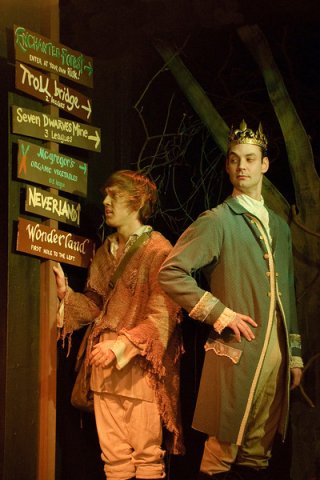 I have always been obsessed with movies. It seems, as I look back at my life, I find that most, if not all, of my memories are somehow connected to a film of some sort. Or perhaps it’s simply coincidence that when I think of a film, I’m transported back to different memories that took place around the time I watched a certain film. It’s the same way that when some people hear a song, they can instantly recall the sights, sounds, and feelings of when they first heard it.
I have always been obsessed with movies. It seems, as I look back at my life, I find that most, if not all, of my memories are somehow connected to a film of some sort. Or perhaps it’s simply coincidence that when I think of a film, I’m transported back to different memories that took place around the time I watched a certain film. It’s the same way that when some people hear a song, they can instantly recall the sights, sounds, and feelings of when they first heard it.
Here’s an example (random though it may seem): I know the very moment when I developed my extreme fear of spiders. I was very young (maybe 3 or 4) sitting on my parents living room floor, watching Stephen King’s “Silver Bullet” (a common theme from my childhood was that I loved horror movies) when I suddenly felt this odd tickling feeling on the back of my neck. I reached back to scratch my head when out of the corner of my eye, I saw this fuzzy black thing crawling down my arm and off onto the floor. I was terrified. I grabbed the tape box (which was made of hard plastic in those days) and began to hit this creature, and though I hit it as hard as I could, it didn’t seem to die; it kept crawling along the ground, which in turn, scared me even more. I get the chills just reliving that memory in my head, but from that day on, I have forever been frightened of spiders of any kind.
Then there was the complete extreme of my first 2 trips to an actual movie theater. The first film my parents ever took me to see was “The Goonies,” which is quite fine for a 6 year-old. Then there’s the far extreme, the second film I ever watched in a theater was “Aliens.” I think it’s this eclectic nature to my early movie-going experience that taught me -- anything is possible in life as it is onscreen.
It wasn’t long after this that my addiction to movies began. I’d hang out at the local video rental place up the street from my house for hours every Saturday and wait for either the new releases to get returned or for something to pique my interest. While I waited, I read the backs of every movie case I could, just to learn different actors’ and directors’ names, and what different films were about. Though many I’d never rent and watch, I’d still fantasize as to what they were about, and often my imagined versions of the films were better or more intriguing that the actual films once I got around to watching them. At this early age, I was very much a fan of campy horror films and action films. When dropped off at a movie theater, I’d often sneak in to see whatever rated R film I was interested in, whether it was the newest Friday the 13th or Die Hard. All I ever seemed to do in my free time was watch movies. I was never that interested in playing sports or hanging out with my friends. I’d prefer to sit at home and either watch a movie or reenact my favorite scenes from movies in my backyard.
Now, even though my love for movies was quite extreme, I, myself, never once imagined that I could be like those people on the screen and become an actor. I simply went along my path in school of being a little hellion who got himself into trouble throughout the majority of his elementary school days. As I hit middle school and high school, I settled down, and I didn’t get into trouble nearly as much as I used to. Though, when the opportunity would present itself, I would be very outspoken if I was bored in class or had a funny comment to toss out. Never enough to warrant detention or a trip to the principal’s office -- just enough to irritate my teachers. Even though I would get on my teachers’ nerves, I was a good student and had made my decision to study and become an English teacher.
Now my decision to become an English teacher wasn’t based on a whim or random thought like, “Oh, I have to pick something to do for the rest of my life.” No, it was a choice I made after 2 things came into my life. The first was my creative writing class. I seemed to have such a fun time creating fun and interesting stories and never seemed to repeat myself. Not to mention that I seemed to get the highest marks in the entire class along with some great compliments of my work. The second thing that help me to choose to become an English teacher was when one of my English classes spent an entire semester on Shakespeare’s “Hamlet.” I had never read Shakespeare before this point in my life. I, of course, had heard the name and some (at that point) random quotes, but I had yet to discover the man, to read his verse, to study every single tiny detail of both Shakespeare’s life and the words, his words of what I now consider to be the closest thing to perfect literature there is: “Hamlet.” It was this almost magical year in my high school life that set me down the path of becoming an English teacher. I began to mold all of my course selections from then on to achieve that goal.
That seemed to be my life, the road I would travel for the rest of my life, until “That Day Came” -- the day when a seed was planted in the back of my mind, “the day I went bad.” It was the spring semester of my sophomore year when my favorite English teacher, my mentor in writing and literature, Wayne Shipley, asked me a very harmless question along with what I took as an odd comment. He asked, “Pat, would you be interested in acting in the drama club’s production of “Oklahoma”? You have a really good face for acting.” I was surprised by the question. Yeah, I love movies and can spout trivia on the subject for days on end, but ACT? I never even remotely considered the idea, and what exactly does “I have a good face for acting” mean? Well, I sadly talked my way out of the opportunity that was being asked of me. I told him I didn’t really have time that year to try out, maybe the next year for the fall production. Mr. Shipley smiled and accepted my response, though I’m sure he could tell I was terrified of the mere idea of performing in front of people.
Spring turned to summer and summer to fall, and I began my junior year of high school. When the day came that the audition notice for the fall production of “The Mouse that Roared” had been posted, I had the conversation with my best friend Steve Carson that would begin the change of direction in my life. We talked about whether our mutual love for movies could actually be used to help us in auditioning. Could we actually pull this off and get parts in the show, knowing absolutely nothing about acting and theater? Then the conversation finally ended with what I now know was the first of my many joking egotistical quotes: “Let’s go out there and show them why we’re the best there is at what we do. Let’s show them how it’s done.” So we auditioned, and I was cast in a fairly decent role for what would be my first performance on a stage -- I would be playing the President of the United States. My friend Steve was cast in a smaller role as Lab Assistant to my Head of Scientific Discovery. The play was fun and I got to meet a lot of new and interesting people. It certainly wasn’t my best performance, but it definitely kept me hooked and interested in acting as a hobby. In the following spring, I performed in the musical “City of Angels.”
In my senior year of high school, I was offered a work study at the NSA, which I ultimately turned down. You see, though a great career opportunity and mark on my resume that job could have been, I chose to turn it down in order to perform in the one-act competition between the 4 grades at our school (we would be judged by real professional actors and given the chance to win awards based on our performances). I also turned down the work study so I could audition for the spring musical “West Side Story,” which was to be Wayne Shipley’s swan song before retiring from being an educator. In the senior one-act, I portrayed a real jerk of a high school football player. He was the coolest guy in school who also turned out to be the loneliest. For this performance, I received the “Best Actor” award, which would be the first award of my then blossoming career as an actor. When the auditions for “West Side Story” came about, I was given the coolest role I had portrayed yet, “Bernardo,” leader of the Sharks gang. I had to learn a Puerto Rican accent, and learn to act like the leader of a vicious gang. It was, without a doubt, the most difficult and complex role I had played thus far. There are 3 things that stick out in my mind the most about this performance. The first was that a Baltimore Sun reporter had come in and written a 5-part weekly series of articles based on the production of the show. It was the first time I was ever written about and pictured in a major newspaper. The second was a compliment from one of my teachers at the time. At intermission we could go out and visit our parents and such, and standing at the door when I walked out was one of my English teachers whose first words were, “Aww, they killed the best part of the show” (my character was murdered just before intermission), and then gave me a hug and told me that I had a talent and ability far beyond my years. This compliment meant so much to me at that point in my life. However, the third and most important thing that has stuck with me to this day from that show was that it was the final time my grandmother was alive to see me on a stage performing to the best of my ability. She was so proud of me that night; I only wish she could have lived long enough to see the performer I have become today.
When high school ended, I took a year off before going to college. I had a job and a social life that simply didn’t include school, much less acting. When I finally began college in the fall of ‘99, I had my entire future mapped out in front of me. I had every detail accounted for in my path to become an English teacher, just like my mentor, Mr. Shipley. 2 years at AACC, then 2 more at Towson University at which point I began my career as a teacher while pursuing my Masters. The plan was set, and it was all going along smoothly until I choose Acting 1 as one of my electives.
The professor of the class was a man who had spent 13 years working on Broadway, Tom Quimby. In the beginning of class, I was quite bored -- after all, I knew all of the basic lessons these students were learning. Then came the day we were to choose a monologue and perform it for the class. Tom sat with the class while I stood before them and began. The speech was from a play based on returning solders from Vietnam. I was portraying one soldier who was in a bar and had heard enough from these draft-dodging punks in the bar with him. I remember the exact line where Tom gave me one of the greatest lessons I had learned to that point: always be REAL, so real that you aren’t just reciting lines with emotion, but live the emotions and let them draw the lines from you. The lesson went something like this: I get up from the bar, drunk, and begin to yell at these young punks; I said the following line: “You’re going to sit there and hear what I have to say, damn it!” at which point Tom stands up from the audience, walks right up to my face, and shouts at the top of his lungs, “(expletive) you, make me!” then he proceeds to walk past me and out the door of the classroom. The class was shocked by this, and it took me a moment before I understood the lesson. When Tom walked back into class, he took his seat and asked if I was ready to try again. Yeah, I was. I understood exactly what he meant so I took a moment to prepare myself and I began again, only this time I made sure the emotion I showed as I spoke kept him in his damn chair. As the semester went on, I began to grow more and more as an actor, learning things I had never even thought of before. The day finally came toward the end of the semester when I asked Tom if he thought I had what it takes to be an actor for a living. It was a random question, the answer to which didn’t really matter because I was about to reach my goal of becoming an English teacher. His response surprised me: “Absolutely, you have one of the most natural acting styles I’ve ever seen. You don’t work from memorizing lines and emotions; you work purely off of instinct. So, yes, I absolutely believe you can do this, but do it because you love it, never do it for a living.” On the final day of class, he asked me to audition for a show he was directing at Colonial Players called “the Learned Ladies.” I took him up on the offer and was cast, thus beginning my relationship with the theater that would soon become like a home, its people like a family to me.
It wasn’t long before I took my professor’s advice to heart: “Do it because you love it, never do it for a living.” I took my time, but I realized my heart wasn’t in becoming a teacher; it belonged to becoming an actor, regardless of the cost to my life both personally and financially. Now, don’t misunderstand, I didn’t decide to throw caution to the wind based on a whim or some random chance of fate. I realized that I’d rather live my life doing what I love the most: acting, than live it for money or some career that I no longer believed would bring me happiness.
In the years that followed, I went from show to show, learning as I did. Every show, I would gain something I lacked, learn something new. Like all lives, there are pitfalls, stumbles along the way, costs to one’s personal life and mistakes made. However, in spite of all these stumbles, mistakes, and relationships and jobs lost along the way, I have never regretted the choice I made so many years ago to become an actor. It helped to make me the man I am today -- not to mention that it brought some of the most amazing people and moments into my life that I, now, couldn’t imagine having lived without. No matter where this road I’m on takes me in this messy world, I can always look forward to my time onstage to set me free in a way from all of my troubles and worries that exist in my life offstage.
So, for every time I’ve missed or simply not taken the opportunity to say it: thank you. Thank you to my former mentors, the audiences over the years, the directors, crew members, castmates, friends and family members who have watched me do what I do best over these years. Thank you for your support. Thank you for everything.
It’s with a good deal of sadness that I am choosing to make this my final blog for the near future. There are some things that require my utmost focus in my private life in the coming year. I do hope that once my life has settled back down a bit that I can continue to contribute content from time to time. I would like to thank Beverly Van Joolen, Laurel Kenney, and Wes Bedsworth for their help and support these past 6 months. I owe the majority of my gratitude to the one man who believed in me enough to first offer me this great opportunity over a year and a half ago. A man who trusted my ideas and the principles I sought to bring to this blog enough to make it unlike any theater blog people have ever read before, as well as letting me name it.
And the man I owe so much to is Terry Averill. I can never thank you enough for this opportunity, and I look forward to a future with Colonial Players that is full of more NEW and cutting edge Ideas and projects.
Finally, I look forward to reading the continued blogs of whomever is chosen to pick up the mantle of OFF BOOK, the Blog from here, and I hope it can continue to be as different and edgy as I have hopefully made it and intended for it to be.
THURSDAY, DECEMBER 1, 2011
The View Through Tinted Glass: A Conversation with Wes Bedsworth
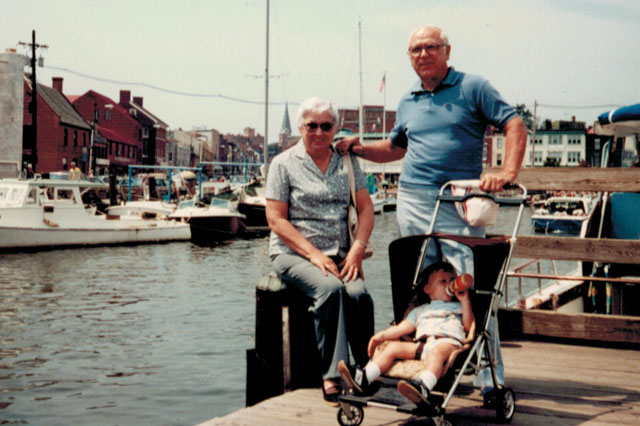
by Pat Reynolds
Pat Reynolds: Let’s start simply at the beginning of sorts with where you grew up.
Wes Bedsworth: I was born in Annapolis, and lived most of my life in Severn. After high school, I lived in Westminster for four years while I attended McDaniel College. I moved to Columbia from there (and realized it was not quite "home" for me), then moved to Annapolis in October 2006. I've lived in the same condo since I moved to NapTown. I never really had an understanding of my past connection to Annapolis until my grandmother passed away a few years ago. I remember going through one of her old photo albums and finding a picture of me in a stroller with my grandparents behind me down on the docks [right]. Today, it looks exactly like it did 28 years ago, just with newer cars in the background. It was just an interesting feeling to see this picture from back then, knowing how much this town means to me today. I go down to the docks these days and just walk around, simply because it’s relaxing and peaceful, and sometimes it’s neat knowing that my late grandparents were there with me when I wasn’t even able to walk yet.
PR: How did you first hear about and eventually get involved with Colonial Players?
WB: I became involved with CP in April of 2007. I am friends with CP member Bob Smith, who just happened to be longtime friends with Edd Miller. Edd was preparing to direct Moon Over Buffalo [below]. One day at work, Bob and I got on to talking about how I had done sound engineering in high school and college for band recordings and at my church. At that point, I had not done anything theater-related. Ever.
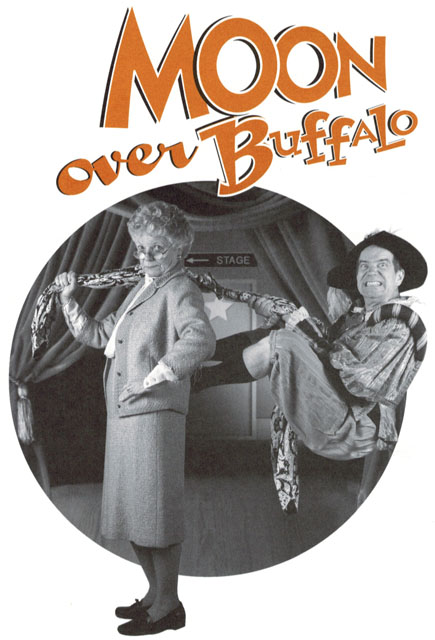 During that conversation, the topic of his friend Edd’s show came about, and that he was in need of a “sound guy.” Bob arranged for Edd and I to meet at the theater one night. It was this same evening that I met with Edd and his cast that I also met Charlotte Robinson who was the Stage Manager. They both “took me under their wing,” so to speak. What was lucky for me, being the new guy thrown into this world, was Edd’s directing style, which was (and still is) to mix the worlds of tech and actors together so that everyone gets to know each other better. It helps make everyone feel like we are one team working together to put on a great production. He makes it clear that it’s not the actors vs. the techs separated by dark tinted glass, but that we’re one cohesive team. That’s how it should be, in my opinion.
During that conversation, the topic of his friend Edd’s show came about, and that he was in need of a “sound guy.” Bob arranged for Edd and I to meet at the theater one night. It was this same evening that I met with Edd and his cast that I also met Charlotte Robinson who was the Stage Manager. They both “took me under their wing,” so to speak. What was lucky for me, being the new guy thrown into this world, was Edd’s directing style, which was (and still is) to mix the worlds of tech and actors together so that everyone gets to know each other better. It helps make everyone feel like we are one team working together to put on a great production. He makes it clear that it’s not the actors vs. the techs separated by dark tinted glass, but that we’re one cohesive team. That’s how it should be, in my opinion.
I remember my first time walking into the tech booth. Nothing worked right, wires were everywhere, and I distinctively remember Charlotte dropping me off in the booth and saying, “I think if you turn on all of the switches, SOMETHING HAPPENS.” The killer was, at the time, some of the equipment was reasonably new, but no one knew how to work any of it. I immediately wanted to get in there and do more than just tech a show. I wanted to re-organize and rewire everything so it worked and was reliable.
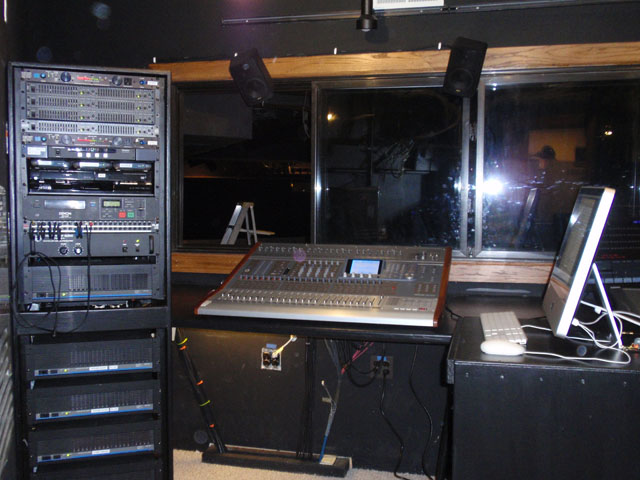 Judi Wobensmith was Production Director at the time, and I think I probably sent her into a panic attack later that year when she heard I wanted to “fix” the booth. I was the new guy, and no one knew if I really knew anything about tech or not. Apparently money had recently been spent having a “professional” company come in and “fix” everything prior to the last show, but you couldn’t tell. I was shocked because NOTHING WORKED. I could see where Judi was coming from at the time -- being uncomfortable with me trying to “fix” things, though, because if somebody off the street were to walk in to the booth today and start talking about rewiring anything, I’d be like…don’t even think about it or I’ll break your fingers [laughs]. After a while, though, I was slowly allowed to start reworking the equipment just so we could adequately use what we had. About a year and a half later, the re-working turned into a major renovation of the entire booth [right].
Judi Wobensmith was Production Director at the time, and I think I probably sent her into a panic attack later that year when she heard I wanted to “fix” the booth. I was the new guy, and no one knew if I really knew anything about tech or not. Apparently money had recently been spent having a “professional” company come in and “fix” everything prior to the last show, but you couldn’t tell. I was shocked because NOTHING WORKED. I could see where Judi was coming from at the time -- being uncomfortable with me trying to “fix” things, though, because if somebody off the street were to walk in to the booth today and start talking about rewiring anything, I’d be like…don’t even think about it or I’ll break your fingers [laughs]. After a while, though, I was slowly allowed to start reworking the equipment just so we could adequately use what we had. About a year and a half later, the re-working turned into a major renovation of the entire booth [right].
PR: In the beginning, what was it about Colonial that got you hooked and kept you coming back?
WB: Charlotte Robinson and Edd Miller, but not just them. I, of course, credit them with getting me hooked in the first place, but it’s also other people like them within the organization. There are too many, so I won’t even try to list them for fear of leaving someone out.
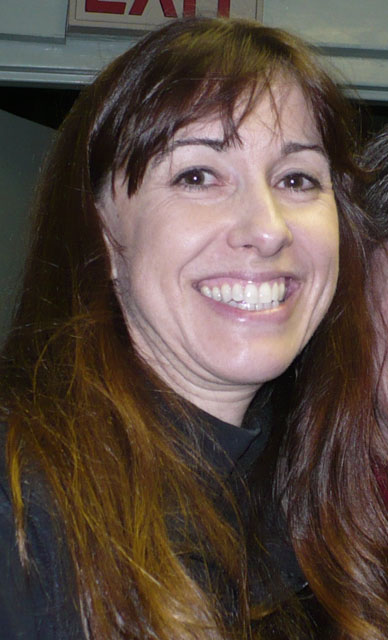 Kindertransport was my third show if I remember correctly. I remember stopping in for some reason during the show that was getting ready to go up at the time and meeting Heather Quinn [left], Producer of Kindertransport. I made the mistake of asking her if they needed a sound tech to help work the booth during the run of Kindertransport.
Kindertransport was my third show if I remember correctly. I remember stopping in for some reason during the show that was getting ready to go up at the time and meeting Heather Quinn [left], Producer of Kindertransport. I made the mistake of asking her if they needed a sound tech to help work the booth during the run of Kindertransport.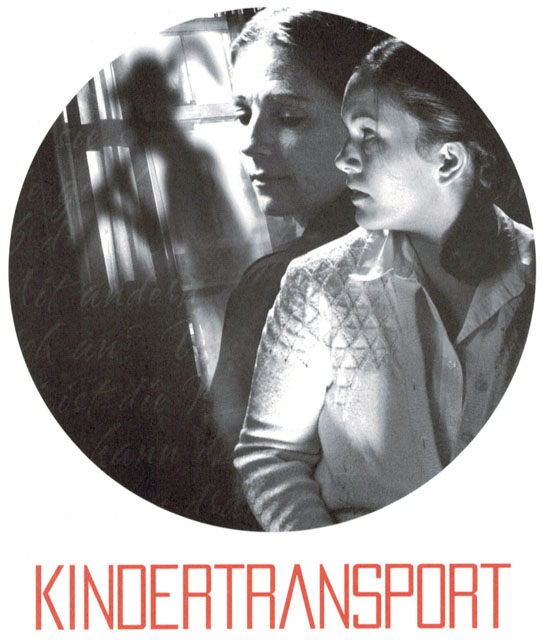 I remember Heather saying, “Oh! Good, we need a sound designer!” Apparently something was lost in translation, because the next thing I knew I had agreed to be the sound designer for Kindertransport [right]. That turned out to be very rewarding because I ended up getting my first WATCH nomination for that show. It was a very proud moment for me because it was my first sound design, and it was overall very complicated to not only assemble, but run properly.
I remember Heather saying, “Oh! Good, we need a sound designer!” Apparently something was lost in translation, because the next thing I knew I had agreed to be the sound designer for Kindertransport [right]. That turned out to be very rewarding because I ended up getting my first WATCH nomination for that show. It was a very proud moment for me because it was my first sound design, and it was overall very complicated to not only assemble, but run properly.
For example, we needed someone with a German accent. I was in the lobby when someone made the mistake of stopping to look at the marquee. I went out to say hello and was greeted with a German accent. I talked him into coming into the theatre and recording all of the train station announcements we needed for the show. We were as desperate as could be to get anything that was as authentic as possible for the sound and aesthetic feel of that show. And for all of the long hours and hard work that went into that design, it is still probably one of my most creative sound designs, both for the equipment we had to work with, not to mention I had no idea what I was doing back then. So in the end, after that really long answer, I’d say it’s the people I get to work with that keep me coming back to CP. It is, in general, a really dedicated bunch of people that love their art.
PR: What was it like when you finally won your first WATCH award for Outstanding Sound Design for Earth and Sky?
WB: A little nerve-wracking. I do not like getting up in front of people in general, and I secretly didn't want to win because I didn't want to have to get up in front of everyone and accept the award. I recall feeling mostly terrified (but excited at the same time) when they called my name at the awards ceremony. I distinctly remember getting up, accepting the award as graciously as I could manage at the time, then looking at the CP people and blurting out something like, "For all the Colonial Players people who are here tonight, enjoy this moment because it is probably as close as you'll ever get me to being on stage.”
PR: Now, if it’s not too personal, why is that? This fear of being in the spotlight?
WB: I’m not a big fan of talking in front of people. I never have been. I took a course on public speaking in high school that was apparently totally lost on me. I do get up at the General Membership Meetings and talk in front of the members who come, and I don’t really enjoy that, but I have gotten more comfortable doing it, mostly because I’ve gotten to know the people who I’m talking to. That, in particular, is not as awkward or nerve-wracking as it used to be. I may have inherited my mother’s love for being behind the scenes and out of the spotlight. She’s the music director/organist at my church, and while she plays in front of everyone every week, it’s rare when you hear her utter a word in front of a group outside of a choir rehearsal.
PR: What was the most emotionally fulfilling or personally touching show you’ve a part of?
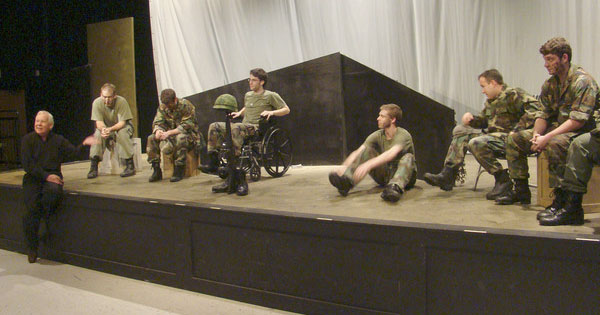 WB: Almost without a doubt it was Tracers at Standing O [right]. I had said from the beginning that I’d never work anywhere other than CP because theatre is a big time commitment, but this was another chance to work with Edd Miller so I made the exception to my rule. Now Tracers, in and of itself, is an emotional show touching on the Vietnam War, and the effects it had on our soldiers. There was this dance number at the end of the show that was brilliantly choreographed by Alicia Sweeney, lit in an amazing red light by Harvey Hack, in front of a mockup of the Vietnam memorial, with “They Won’t Go When I Go” by Stevie Wonder scoring loudly behind it all. This was all followed by complete darkness, a 21-gun salute, and simulated voices of veterans. At first we weren’t sure how it was going to turn out because on paper it seemed like it was potentially a long ending. It ended up being the most moving part of the show for me and for others too, from comments I heard. It was the first time that a show had me choked up every time I worked it. It really became this very emotional and at the same time a very personal show for me, since both of my grandfathers (and several other relatives) had served in the armed forces.
WB: Almost without a doubt it was Tracers at Standing O [right]. I had said from the beginning that I’d never work anywhere other than CP because theatre is a big time commitment, but this was another chance to work with Edd Miller so I made the exception to my rule. Now Tracers, in and of itself, is an emotional show touching on the Vietnam War, and the effects it had on our soldiers. There was this dance number at the end of the show that was brilliantly choreographed by Alicia Sweeney, lit in an amazing red light by Harvey Hack, in front of a mockup of the Vietnam memorial, with “They Won’t Go When I Go” by Stevie Wonder scoring loudly behind it all. This was all followed by complete darkness, a 21-gun salute, and simulated voices of veterans. At first we weren’t sure how it was going to turn out because on paper it seemed like it was potentially a long ending. It ended up being the most moving part of the show for me and for others too, from comments I heard. It was the first time that a show had me choked up every time I worked it. It really became this very emotional and at the same time a very personal show for me, since both of my grandfathers (and several other relatives) had served in the armed forces.
PR: Are there any standout artists, actors, directors, etc. in our local community whose work inspires you?
WB: Are you fishing for me to say Pat Reynolds?
[We both have a good laugh]
PR: No, not at all, I want to keep my name out of this if at all possible! Just some local work in general that has touched you or that you’ve found yourself in awe of.
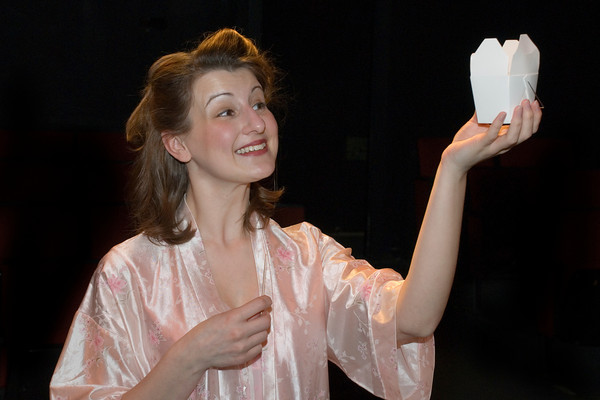 WB: If I had to pick someone, since I’ve already mentioned a director, I’ll go with someone on stage: Aimee Lambing [left]. As an actress, I’m very much in awe of her professionalism and talent. I remember watching her in She Loves Me one night (another show I designed). We used canned music for this show that we had recorded in advance, and it all played through the brand new tech booth system from a Mac that I swore up and down would never fail.
WB: If I had to pick someone, since I’ve already mentioned a director, I’ll go with someone on stage: Aimee Lambing [left]. As an actress, I’m very much in awe of her professionalism and talent. I remember watching her in She Loves Me one night (another show I designed). We used canned music for this show that we had recorded in advance, and it all played through the brand new tech booth system from a Mac that I swore up and down would never fail.
With all new equipment we, and by we I think I mean only the singular we – me, were confident that nothing could go wrong. But sure enough, the night I bring friends and sit in the audience for a change to watch the show, Murphy crept in the tech booth door. With absolutely no control over the situation or the ability to get up and try to fix the problem, the music cut out about 3 bars into one of her [Aimee] big solos. I remember just sinking in my seat knowing that even though I had nothing to do with the problem, I still felt responsible for whatever had happened. As I sat there feeling rather helpless, I watched this amazing artist carry on acapella, without missing a beat or getting thrown off in any way. I remember thinking that even with this gigantic tech mishap, this actress made the moment her own and perhaps better than if the music had played.
At intermission, I wandered backstage, pretty upset, to apologize to Aimee about what happened. Instead of giving me a death stare, which is what I was expecting, she said the sweetest thing: “Oh, don’t worry about it, it’s fine, these things happen in live theatre. It’s not your fault, I got through it just fine.” I really respect and admire her professionalism -- that and for not coming at me with a sharp object in-hand. And for the record, I was only expecting a death stare because I really didn’t know her very well at the time.
PR: In your opinion, what are some of the biggest challenges to the future of CP?
WB: In the long term, one of the things I see as a large challenge is finding ways to bring in new volunteers to help sustain our organization well into the future, with fresh and new ideas for us. I realize this is a challenge people have always talked about, but it’s not one that’s ever really going to go away. It’s also a touchy challenge because I know the reaction can be “What’s wrong with the existing people? Why do we need new ones to replace them?” It’s not so much a matter of replacing people at all, but in getting more of the community involved and bringing in more creative talent and new ideas to try!
Communication is another challenge for us that I notice. We have a lot of people doing a lot of different things to make sure we’re successful and put on show after show. Finding ways to keep everyone in the loop on what’s important to their area can be difficult - especially considering most of us work "real jobs" during the day! We’ve made some good strides with this recently, but still have room for improvement in my opinion.
PR: It’s the basic design of any business to grow, adapt, and evolve. I completely understand your thoughts, and trust me, I’ve heard all sides of this “challenge.” And you’re right, some people do see it as an insult and take the stance that younger or newer immediately means “replacing” anything that is older. My personal opinion of the entire situation is that it’s not about “replacing” anyone or anything, but rather, “growing,” finding a way of simply gaining MORE people, growing a larger, more diverse audience that keeps returning.
WB: Exactly, and newer doesn’t necessarily mean younger, either. We’re a community organization. We should be reaching out to the community and bringing people in to work on our shows and to see our shows. It’s my view that a lot of it can come down to good marketing. We took great strides with Beth Terranova as former Marketing Director when we finally launched our new website after two long years of trying to get there. This was a much needed face lift to our once wonderful but aged website. It is now a tool that continues to grow, expand, and evolve to draw new interest in our organization.
I’ve also seen firsthand many of the new ideas that Beverly van Joolen and the current marketing team are working on paying off in really great ways such as partnerships with restaurants and the hotels downtown that get our name out there. People are bombarded by advertising from all sides, all of the time. We have to compete for their attention and time more than ever. I’ve also seen great leaps stepping us more into this digital age we live in by getting CP on Facebook and Twitter. These are two tools where advertising doesn’t cost us anything.
![]() Another challenge we as an organization need to work on is finding a way of getting more of our younger generation to commit to subscriptions rather than the occasional walk-up ticket sale. Again, this comes down in large part to marketing. I really feel the Flex Pass that was developed a few seasons ago is a great answer for this younger generation because of the additional flexibility it offers compared to a standard subscription. Unfortunately, since its introduction we probably have not done a good enough job promoting or explaining it. Increased focus in this area will benefit us in the long term.
Another challenge we as an organization need to work on is finding a way of getting more of our younger generation to commit to subscriptions rather than the occasional walk-up ticket sale. Again, this comes down in large part to marketing. I really feel the Flex Pass that was developed a few seasons ago is a great answer for this younger generation because of the additional flexibility it offers compared to a standard subscription. Unfortunately, since its introduction we probably have not done a good enough job promoting or explaining it. Increased focus in this area will benefit us in the long term.
PR: How did you find your way to the Board of Directors at CP?
WB: I was at my office late one night and received a phone call from a number I didn’t know. Against my better judgment, I answered it and found myself talking to Joan Hamilton. She proceeded to talk me into a position that no one had ever held on the board: Operations Director. She outlined, over the phone and over roughly an hour, the general duties that the current board envisioned for the position. It sounded mostly straight forward, but the more I got into it, the deeper I found the "rabbit hole" of theatre operations went. There's a lot to think about and consider related to our building to make sure everything stays in safe working order!
PR: Before we finish up here, I’d like to ask what your thoughts are in summary of your time here at CP -- as well as any other thoughts or feelings that we haven’t touched on this evening.
 WB: In spite of all the challenges, I enjoy my role at CP. The challenges are probably what keep bringing me back. I don't feel like I need to be onstage and get a round of applause to feel like I accomplished something there. We have a wonderful old building that is a bottomless pit of the type of projects I like to do. I told someone shortly after I got involved and found all the things I could "fix" that it was awesome to have an organization that willingly finances my hobby! Where else would I have had both a reason and a budget allowing me to not only learn about, but design, install, and configure a building automation system [left]? Was that project directly relevant to our mission? A few might say no, but in the end, knowing that it keeps our assets secure, our members safe, reduces our energy consumption (thus saving us money over time), and allows us to be more efficient in general, I'd say absolutely yes.
WB: In spite of all the challenges, I enjoy my role at CP. The challenges are probably what keep bringing me back. I don't feel like I need to be onstage and get a round of applause to feel like I accomplished something there. We have a wonderful old building that is a bottomless pit of the type of projects I like to do. I told someone shortly after I got involved and found all the things I could "fix" that it was awesome to have an organization that willingly finances my hobby! Where else would I have had both a reason and a budget allowing me to not only learn about, but design, install, and configure a building automation system [left]? Was that project directly relevant to our mission? A few might say no, but in the end, knowing that it keeps our assets secure, our members safe, reduces our energy consumption (thus saving us money over time), and allows us to be more efficient in general, I'd say absolutely yes.
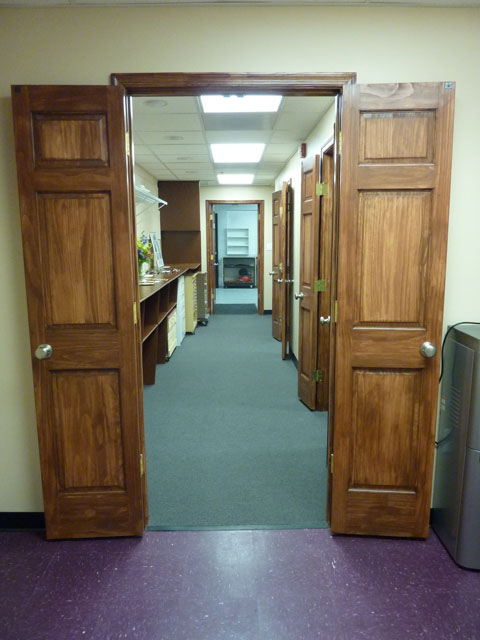 The most rewarding part of working behind the scenes for me, both on the tech side and the theatre operations side, is when someone comes up to me unsolicited and tells me about something they noticed that I fixed, improved, or added related to the building or tech. Most are usually impressed when I actually point out whatever project I'm currently working on, but when someone notices and takes the time to either tell me they noticed or tell me how it’s helping them do their job better, I love it. Most of what I do goes beyond "behind the scenes" and is truly unseen, so when someone notices, it's as good to me as a round of applause after a great performance for someone onstage.
The most rewarding part of working behind the scenes for me, both on the tech side and the theatre operations side, is when someone comes up to me unsolicited and tells me about something they noticed that I fixed, improved, or added related to the building or tech. Most are usually impressed when I actually point out whatever project I'm currently working on, but when someone notices and takes the time to either tell me they noticed or tell me how it’s helping them do their job better, I love it. Most of what I do goes beyond "behind the scenes" and is truly unseen, so when someone notices, it's as good to me as a round of applause after a great performance for someone onstage. 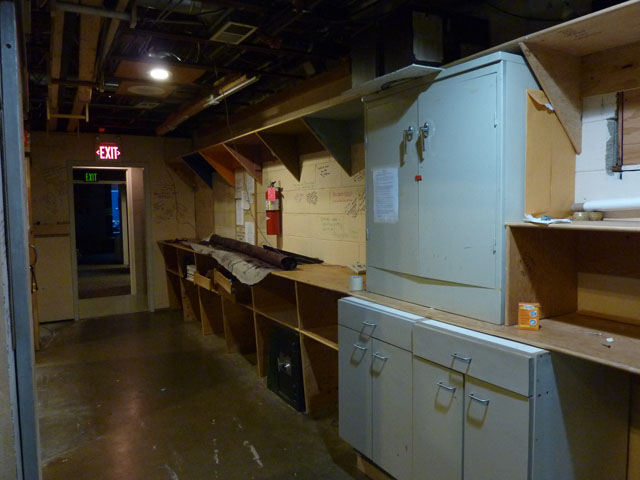 Or in my ever-supportive Kaelynn’s words, “That’s very… um… nice. What is it? In non-technical terms, please.”
Or in my ever-supportive Kaelynn’s words, “That’s very… um… nice. What is it? In non-technical terms, please.”
For some reason, unknown to even me, I have a passion and a love for not only making sure we are successful as an organization, but also that we have quality equipment and facilities in which to perfect our art. I thoroughly enjoy maintaining our facilities and tech, finding ways to improve them, fixing problems, and dragging the organization as a whole (sometimes kicking and screaming) into modern times. It seems that at least most people don’t mind the effort, either... :o)
Photos (in order from top to bottom):
(1) Wes in Annapolis, 8/1984
(2) Moon Over Buffalo playbill cover, 5/2007
(3) Renovated Tech Booth, 7/2008
(4) Heather Quinn at opening night of Kindertransport, 10/2007
(5) Kindertransport playbill cover, 10/2007
(6) Tracers cast during post-show talkback, 12/2009
(7) Aimee Lambing in She Loves Me, 4/2009
(8) CP subscribe logo
(9) Theatre Automation System, 8/2011
(10) Renovated backstage prior to grand opening celebration, 8/2011
(11) Closing night of last show in old backstage, 6/2011
TUESDAY, NOVEMBER 1, 2011
by Pat Reynolds
Epilogue:
"I’ve never done Macbeth, but --"
"Stop!" Laurie screamed, but it was too late.
Thunder CRACKED outside of the historic theatre, briefly lighting up the lobby, then darkness engulfed the building. The only sound from the gold-gilded stage was the director's breath keeping rhythm with the rain pelting against the historic building’s tin roof. Running lights hooked into an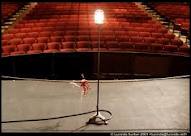 emergency generator glowed red from backstage and cast an eerie smolder of blood-on-the-moon over the drop that now hung crooked from the fly. Suddenly and briefly, silence hung heavy in the usually welcoming space until it was shattered by a bloodcurdling scream. It was the seventh of ten screams heard that night.
emergency generator glowed red from backstage and cast an eerie smolder of blood-on-the-moon over the drop that now hung crooked from the fly. Suddenly and briefly, silence hung heavy in the usually welcoming space until it was shattered by a bloodcurdling scream. It was the seventh of ten screams heard that night.
Inside the theatre, terror gripped those left inside. Only three of the troupe remained - Laurie, the director, and her two leads, Tommy and Nancy. Laurie left to try and turn the breakers back on, but the best she could manage because of the water damage was a continuous flickering. When she returned to the stage, the actors stood shivering, hands clenched, as an eerie strobe-effect lit them.
“This is the best I could do for the lights," she yelled up the aisle. "Have you seen anyone else?"
“They're gone,” Tommy said, barely keeping his fear at bay.
"Seven people don’t just disappear,” Laurie snapped, "They have to be somewhere!”
“We’re next, I know it," Nancy whimpered, "It‘s coming for us next.”
Laurie walked through the auditorium and leaned on the stage for strength. “Calm down. The cast is just playing a practical joke on us. Where's your sense of humor.”
“It's not a joke, and it's not funny!” Nancy pointed at Tommy. “He did this; it’s his fault!"
“He did whaaa…!” Before Laurie could finish the question, an unseen force lifted her body up into the painted and domed ceiling. Both Tommy and Nancy stood staring in shock as they watched the director's body hover over the seats as if held up by an invisible hand. Nancy screamed, and when the lights flicked black then back on, Laurie was gone. She had disappeared, just as inexplicably as the rest of their castmates.
Nancy slapped Tommy. “This is your fault. You're an idiot!”
“I’m sorry," he snapped back. "I was just joking around. I didn't think that superstitious stuff was true. Let's get out of here and call the..."
Tommy didn't finish his sentence. Halfway up the aisle, ghostly patrons materialized in the seats. Their faces stared at the two actors, daring them to continue. The exit was only twenty paces ahead. Tommy grabbed Nancy's hand and broke into a run. The ghouls reached for them, flew over him, pulled at him. A damp chill enveloped him.
"Don't let go!" he yelled back at Nancy, but her death-like grip was ripped from his fingers as she screamed his name. Tommy turned just long enough to watch the Ghostly patrons fly her up into the dome. He stood paralyzed by fear as the phantoms surrounded him. The exit had vanished. There was nowhere to run, and as the apparitions closed in, he heard Nancy's terrified wail. “Why did you have to say MACBETH...”
SUPERSTITIONS
As I write, Halloween is fast approaching, and though it will have passed by the time you read this, I felt theatre superstitions were the perfect topic for this month’s Off Book. If you search “theatre superstitions” on the web, a plethora of articles will pop up, mostly touting Top Ten lists and all sharing similar structure, theme, and presentation. The numerous lists note specific superstitions and their origins. Repetitive lists, however, don’t tell the story behind the superstition. They don’t, for instance, explain why we indulge in and continue to give credence to superstitious behaviors. After some quiet contemplation, a chill snaked up my spine as I realized that what all those theatre superstitions have in common, that what the driving force behind them is, is FEAR.
A non-thespian might ask what actors, directors, and crew could possibly have to fear. Ah, therein is the heart of it -- we fear a great deal, it turns out. Actors, directors, designers, playwrights and crew fear failure, not being liked, appreciated, understood. We fear we wont affect the audience as we’d hoped to. We fear a weak production, equipment failure, going up on a line, twisting an ankle, forgetting an entrance.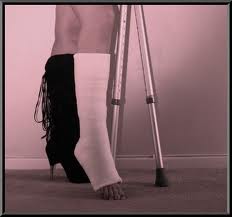 Most of all, however, we fear that by not paying homage to traditional superstitions, we will jinx a performance and fall to the ravages of the curse, just as the characters in Epilogue did!
Most of all, however, we fear that by not paying homage to traditional superstitions, we will jinx a performance and fall to the ravages of the curse, just as the characters in Epilogue did!
Theatre folk aren’t the only group of people to suffer from superstitions, of course, but we have a lengthy litany of them, and none are more commonly shared or as quirky as NEVER, EVER saying M-A-C-B-E-T-H inside a theatre. What is the psychology of the need for our superstitions? Why do we avoid walking under a ladder or crossing where a black cat walked? Why do we mistrust the number 13 or bless one another after sneezing? It’s not just an actor’s nature to believe superstition; it’s human nature, and I bet you could make a pretty lengthy list of your own.
For instance, I once worked with a director who had a small doll he placed onstage in all of his shows as just a simple set piece. No one in the audience would see it as anything other than a simple set decoration. The cast and crew, however, knew that it was placed there as a special request from the director; it was his good luck charm for the production. No one else ever looked beyond that, but being the ever-curious lad that I am, I asked him about it while out drinking one night after a rehearsal.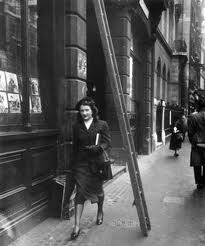 He explained to me that it was the last remaining item of his grandmother’s that he owned; it was her favorite toy as a child, and it held sentimental value to him. You see, throughout his career in theater, his grandmother had seen every show he had ever performed in or directed, from his very first up until her passing, and this was his way of carrying on the tradition of having his grandmother at each of his productions. He couldn’t imagine ever doing a show where the doll couldn’t be placed somewhere on stage. It would simply be bad luck to break from his tradition.
He explained to me that it was the last remaining item of his grandmother’s that he owned; it was her favorite toy as a child, and it held sentimental value to him. You see, throughout his career in theater, his grandmother had seen every show he had ever performed in or directed, from his very first up until her passing, and this was his way of carrying on the tradition of having his grandmother at each of his productions. He couldn’t imagine ever doing a show where the doll couldn’t be placed somewhere on stage. It would simply be bad luck to break from his tradition.
Another colleague, a light designer, comes in early before every performance and turns each and every light on and off; every cued light change and every lighting transition used in the show six times, each individually. I routinely arrive at call two hours early, so I witnessed this compulsion first hand and found it quite interesting. I asked this person about the routine and was informed it was just a way to feel comfortable that all the lighting cues would be hit and nothing bad would happen during the show. I asked about the significance of six times and was told it was because the show had six cast members, one time for each of them. If the cast were to have ten members, the routine would be implemented ten times. The lighting designer followed up with, "It’s just for good luck," and to him, that explained it all.
Anyone who has ever worked with me will agree that I, too, have numerous quirks, compulsions, and superstitions before I go on for a performance. The smallest good luck charm I bring to a show is a book I set up in the dressing room. It’s a small book about Marlon Brando filled with various pictures from every film he ever made. I flip through it prior to curtain and look at certain pictures in it before going on stage.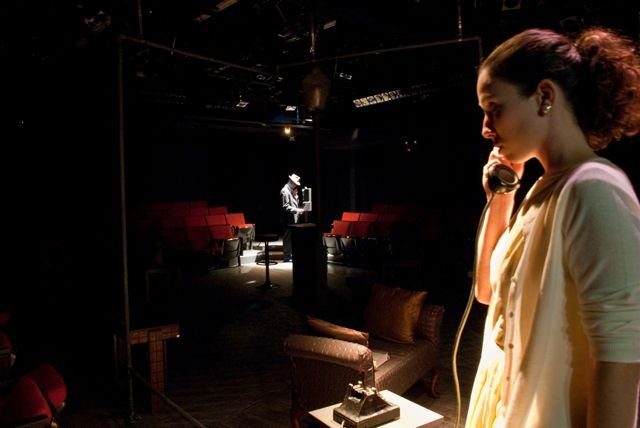 I need to do this during every show. Fellow cast and crew mates will attest to my other quirks - jumping up and down five times just prior to going onstage, staring in the mirror and crossing myself (despite my lack of religious affiliation of any kind) and saying a certain "special" phrase to myself in a tone not to be overheard by others before leaving the dressing room -- every time I leave the dressing room to go onstage. Then, of course, there is my most visible, audible, and probably the most annoying compulsion I have before going onstage - the gargle -- okay the loud gargle. Every one of the many times I drink water during a performance, I gargle exuberantly. So as odd or bizarre as these routines might seem to others, they are what relax me and get me into a certain state of mind. Having gone through my routines, I’m confident that when I walk onstage, I know deep down that I am prepared, that I am ready, and that nothing bad can possibly happen because I’ve gone through my personal check-list of superstitious activities. Having done so, I cannot jinx myself or the production in which I am about to perform.
I need to do this during every show. Fellow cast and crew mates will attest to my other quirks - jumping up and down five times just prior to going onstage, staring in the mirror and crossing myself (despite my lack of religious affiliation of any kind) and saying a certain "special" phrase to myself in a tone not to be overheard by others before leaving the dressing room -- every time I leave the dressing room to go onstage. Then, of course, there is my most visible, audible, and probably the most annoying compulsion I have before going onstage - the gargle -- okay the loud gargle. Every one of the many times I drink water during a performance, I gargle exuberantly. So as odd or bizarre as these routines might seem to others, they are what relax me and get me into a certain state of mind. Having gone through my routines, I’m confident that when I walk onstage, I know deep down that I am prepared, that I am ready, and that nothing bad can possibly happen because I’ve gone through my personal check-list of superstitious activities. Having done so, I cannot jinx myself or the production in which I am about to perform.
Superstitions are harmless really, a little bit of folk magic we incorporate into our daily lives. Whether it’s a superstition as old as not saying a forbidden Shakespearean character's name in a theater or some little item we place on the stage during a performance, it’s a personal checklist of things we all do in our lives to make us feel comfortable about our actions. Superstitions are nothing more or less than things we do to make us feel that no bad thing can occur because we’ve protected ourselves with these little quirks or compulsive acts. At the end of the day, nothing is as effective against things going wrong as preparation and a back-up plan in case they do. On the other hand, a little bit of magic and superstition can’t hurt, just in case a neophyte utters M-A-C-B-E-T-H...
So, you know my quirks…what are yours? Share your pre-show routines, superstitions, and quirks with us by hitting the feedback link at the top. I dare you....
Don't miss out! Sign up for our email list by clicking here!
To contact The Colonial Players, please refer to the email directory on our Contact Us page or email This email address is being protected from spambots. You need JavaScript enabled to view it..
For questions about tickets and subscriptions, email This email address is being protected from spambots. You need JavaScript enabled to view it..
For website comments, questions, suggestions, as well as copyright and usage information, please contact This email address is being protected from spambots. You need JavaScript enabled to view it..
Copyright 2025 • The Colonial Players, Inc. • 108 East Street • Annapolis, MD 21401 • Phone: 410-268-7373
